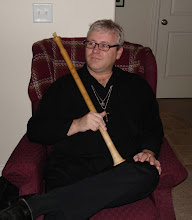OMG! OMG!
Buffy's new album is on the way from Canada! I can hardly wait. Anne Linnets nyt album er også ude nu. Jeg også venter for det.
This has been a really good semester. My music research professors are looking for potential awards for one of my research papers, an overview of the douçaine. I'm also feeling really good about my larger paper, the historiography of the douçaine. I got my own copy of Barra Boydell's book on crumhorns yesterday and I am inspired to do a similar book for the douçaine farther down the line. I spent a little time on the method book yesterday. I can't imagine that too many people would want to play anything in Eb minor on the douçaine, but I think it is good practice in dealing with the difficult forked fingerings. That type of practice really helped me in a concert on Monday, where I did the cantus parts on some Landini ballatas. I found a couple with the right tessitura for tenor douçaine with lute playing the tenor line. Joe is a great improviser, so the role reversal worked out great.
Wednesday, November 19, 2008
Sunday, November 2, 2008
Congratulations! You are: a Medieval!
I took a goofy on-line philosophy test. It had remarkably bad grammar and spelling. I have never seen anyone refer to Bach as medieval. It's only a few centuries off.
At any rate, here are the results
The Medieval
25% Ancient, 31% Medieval, 31% Modern and 13% Post-Modern!
Medieval philosophy is probably more pessimistic than any other. One really gets the sense that medieval thinkers lived in a cold, dark, unreliable world, where pleasure was so hard to find that the desire for it became nearly uncontrollable. This is a world where the sinner is clearly divided from the saint
I tried to write the test in such a way that you didn’t have to be a religious person to get this result. The medieval way of looking at the world is not simply religious. It’s a serious, hierarchial, compulsive worldview, with a moral seriousness missing from some other eras. Medieval philosophers include some brilliant incisive minds, like that of Thomas Aquinas. What makes medieval philosophers unusual is the direction of their inquiries--they turned their gazes inward, to examine themselves, or upward, towards God, but hardly ever outward, towards the world around them.
Some medieval philosophers: Augustine, Anselm, Aquinas, Maimonides, Abelard, Erasmus
Some medieval artists: Dante, Chrétien de Troyes, Christine de Pisan, Rabelais, Chaucer, Bach
Typical medieval art forms: the morality play, war stories, contrapuntal music, the sermon, scatological humor, romantic poetry
At any rate, here are the results
The Medieval
25% Ancient, 31% Medieval, 31% Modern and 13% Post-Modern!
Medieval philosophy is probably more pessimistic than any other. One really gets the sense that medieval thinkers lived in a cold, dark, unreliable world, where pleasure was so hard to find that the desire for it became nearly uncontrollable. This is a world where the sinner is clearly divided from the saint
I tried to write the test in such a way that you didn’t have to be a religious person to get this result. The medieval way of looking at the world is not simply religious. It’s a serious, hierarchial, compulsive worldview, with a moral seriousness missing from some other eras. Medieval philosophers include some brilliant incisive minds, like that of Thomas Aquinas. What makes medieval philosophers unusual is the direction of their inquiries--they turned their gazes inward, to examine themselves, or upward, towards God, but hardly ever outward, towards the world around them.
Some medieval philosophers: Augustine, Anselm, Aquinas, Maimonides, Abelard, Erasmus
Some medieval artists: Dante, Chrétien de Troyes, Christine de Pisan, Rabelais, Chaucer, Bach
Typical medieval art forms: the morality play, war stories, contrapuntal music, the sermon, scatological humor, romantic poetry
Subscribe to:
Posts (Atom)
